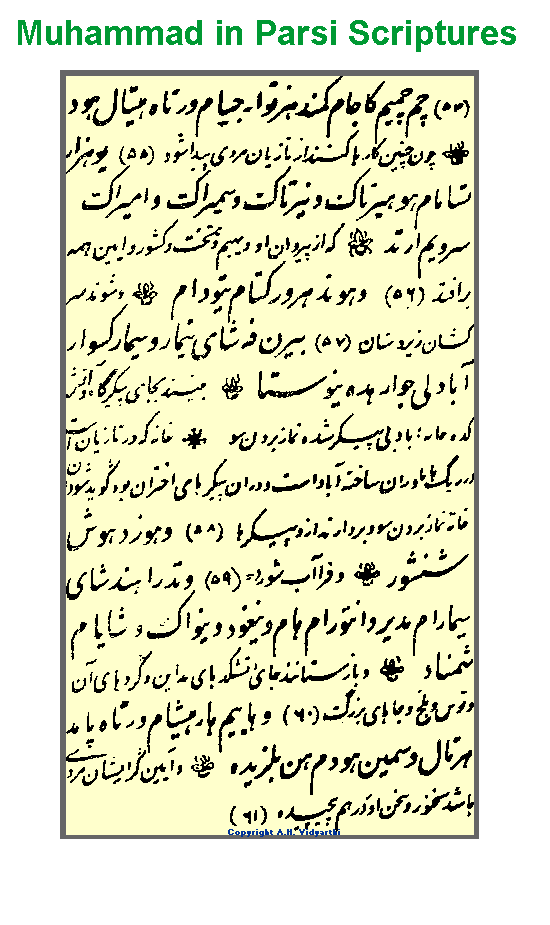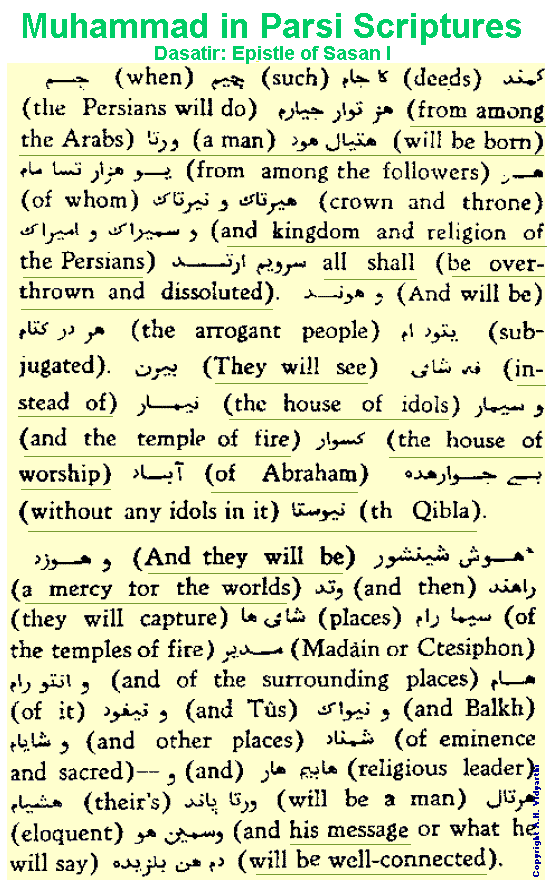The original Text in Pahlavi

Zoroaster (The Parsi 'prophet'), prophesized the coming of a "Soeshyyant", which means a "Mercy for the World". Remarkably, the prophet of Islam MUHAMMAD (p.b.u.h) is referred to in Al-Qur'an as a "Mercy for the World" (Surah 21:Verse 107). There are many instances in both the main books of the Parsi religion of the coming of an "Astvat-ereta", meaning the "Praised One". Again, it is remarkable that the name Muhammad means the "Praised One".
In the "Dasatir", the Parsi epistle of Sasan 1, the following prophecy occurs (translated from the old Pahlavi Language).
"When the Persians should sink so low in morality, a man will be born in Arabia, whose followers will upset their throne, religion and everything. The mighty stiff-necked ones of Persia will then be overpowered. The house which was built, and in which idols have been placed will be purged of idols, and people will start to say their prayers facing towards it. His followers will capture the towns of Madina, and Tus and Balkh and other sacred places. Their leader will be a man eloquent and his message will be well connected. The wise men of Persia and other places will join his followers"
The above is self-evident, from the beginning to the end,
the religion of Islam is predicted. No commentary is necessary as many
clear signs are mentioned in the quotation. The Kaaba (divine house) becoming
free of idols and being the Qibla, the Arabian prophet, his companions
and the Islamic conquest are precisely mentioned amongst other signs. It
is impossible for people to deny such a clear prophecy.
The Epistle of Sasan I in Dasatir contains the prophecy about Prophet Muhammad. Sasan I was a reformer of the Zoroastrian religion. It is believed that this Epistle is a part of the teachings of Prophet Zoroaster, to which Sasan I added his explanatory notes. Some scholars have suggested that the word ‘Dasatir’ means ten (das) parts (tir) while others contend that this word is derived from Dasatur, meaning religious law. The Zoroastrians are also known as ‘Magians’ and ‘Fire Worshipers.’
The original Text in Pahlavi

The Epistle of Sasan I describes future events at a time when Zoroastrians will have forsaken their religious practices. The English translation of the Epistle of Sasan I is presented below.
“When the Persians will do such deeds, a man from among the Arabs will be born whose followers shall overthrow and dissolve the kingdom and religion of the Persians.The word for word translation of the Epistle of Sasan I is given below. The text of this Epistle is taken from Dasatir published by Mulla Pheroze during the reign of Shah Nasiruddeen Kachar of Persia. Mulla Pheroze lived in Bombay (India) and he was an eminent scholar of Pahlavi, Zend, Persian, and Arabic languages. He consulted with several famous Zoroastrians priests to authenticate his translation. The original text is in Pahlavi.
And the arrogant people (Persians) will be subjugated.
Instead of the temple of fire and the house of idols they will see the House of Abraham without any idols as their Qibla.“And they (Muslims) will be a mercy to the worlds.
And they will capture the places of temples of fire, Madain (Ctesiphon), nearby lands, Tus and Balkh, and other eminent and sacred places (of Zoroastrians).
And their leader (Prophet Muhammad) will be an eloquent man whose words and message will be clear and far-reaching.”

There are many prophecies in Dasatir and in Zend Avesta, the other sacred book of the Zoroastrians. The word ‘Astvat-ereta’ in the prophecies means ‘the praised one’ which is Muhammad in Arabic. Some prophecies are found in Farvardin Yasht XIII:17 and XXVIII:129, Zamyad Yasht: 95, and Atash Nyayish: 9.
![]()
References:
1. Abdul Haq Vidyarthi, "Muhammad in World Scriptures,"
Adam Publishers, 1990. (includes chapters on Zoroastrian and Hindu Scriptures)
2. A.H.Vidyarthi and U. Ali, "Muhammad in Parsi, Hindu
& Buddhist Scriptures," IB.
![]()
Qur'an 35:24 Verily We have sent thee (Muhammad) in truth as a bearer of glad tidings and as a warner: And there never was a people without a warner having lived among them (in the past).
Qur'an 16:36 For We assuredly sent amongst every People an apostle (with the Command) "Serve Allah and eshew Evil": Of the people were some whom Allah guided and some on whom Error became inevitably (established). So travel through the earth and see what was the end of those who denied (the Truth).
Qur'an 2:256 There is no compulsion in religion.
The right direction is henceforth distinct from error.
And he who rejecteth false deities and believeth in Allah hath grasped a firm handhold which will never break.
Allah is Hearer, Knower.